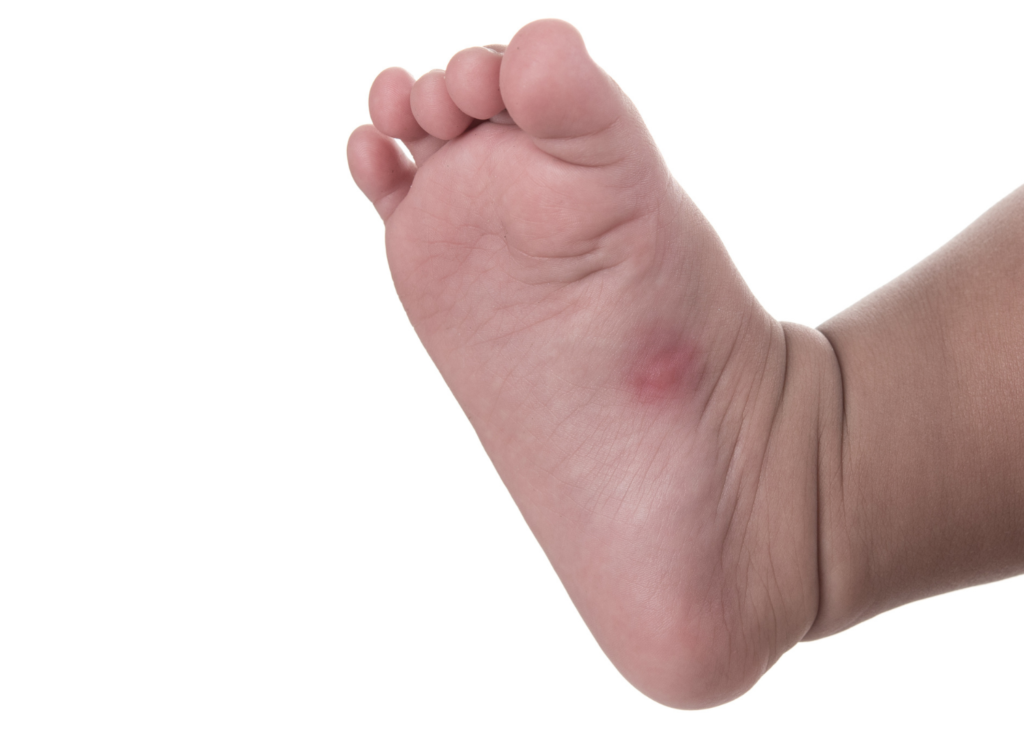Babies And Bug Bites- How To Treat And Prevent
May 4, 2022 2024-06-20 17:22Babies And Bug Bites- How To Treat And Prevent
Babies & Bug Bites- How To Treat And Prevent

🐜It’s that time of year…mosquitos, ticks, fleas, chiggers, and biting flies are out in full force.
Fresh air and getting out into nature is fun, as well as beneficial for good health and emotional well being. But how do you best protect your babies and young children from the discomfort of insect bites and the possibility of mosquito- or tick-borne diseases?
We’ve compiled three lists for you:
1) effective ways to prevent bug bites and the diseases they may carry
2) safe ways to treat and relieve symptoms
3) when it’s time to call the doctor
Our recommendations are compiled from the guidelines put forth by the American Academy of Pediatrics, Centers for Disease Control, and the Environmental Working Group. Reference links provided at the bottom of this page.
First, a few points to highlight…
- Do NOT use repellents of any kind on babies under 2 months old.
- All chemicals listed here are considered safe during pregnancy and while breastfeeding when used as directed
- No repellent is 100% effective.
- “Natural” or botanical ingredients/essential oils are often not the ideal choice due to lower efficacy and highly concentrated allergen content.
- Test a small area first and check for reactions before slathering your or your baby’s whole body.
- All the following options protect against biting insects, not stings!
- Repellents should not be put on a baby’s or children’s hands, due to risk of ingestion.
- Be aware that using insect repellents will reduce the protective factor of sunscreen.
- Different environments may require different preventative measures, especially in areas with risk of lyme disease. The following guidelines are general.
PREVENTION:
- Avoidance.
- Stay away from areas that attract flying insects greatly reduces your chance of being bitten. Bodies of water, flowerbeds, and orchards are high insect areas. Also, biting insects tend to be most active at dawn and dusk.
- Mosquito netting over strollers or baby carriers can be highly effective.
- Do not use perfume and scented personal care products, as they may attract insects.
- Choose neutral colored clothing. Bright or floral printed fabrics are attractive to insects.
- Dress baby in socks or close-toed shoes.
- Clothing. Of course, an effective way to prevent biting insects from finding your baby’s delicate, sensitive skin is to cover it up! But summer fabrics are thin and permeable…and bugs (especially mosquitoes) may bite through the fabric.
- Permethrin treated clothing is an option that’s very effective for ticks, less so against mosquitoes and other biting insects. It is an insecticide that is terrible for the environment, but not considered to be a threat to humans, despite that the EPA classifies it as a “likely human carcinogen” based on observations in mice. EPA states that “permethrin factory-treated clothing is unlikely to pose any significant immediate or long-term hazard to people,” including toddlers, pregnant women and nursing mothers. If you choose this option, remember that it is not safe to apply directly to skin, and treated clothing needs to be washed separately. The chemical remains active, even after multiple washings.
- Clothing. Of course, an effective way to prevent biting insects from finding your baby’s delicate, sensitive skin is to cover it up! But summer fabrics are thin and permeable…and bugs (especially mosquitoes) may bite through the fabric.
Despite being annoying and causing temporary discomfort and pain, bug bites are usually harmless. Typical reactions are localized to the bite site, and may or may not include varying levels of pain, itch, rash, swelling, sensation of heat, tingling, or numbness. These physical reactions are due to an immune reaction in the body, which produces histamines and stimulates nerves, increasing blood flow and sending white blood cells to the area to promote healing. Some bites will produce a water blister in the center, which is normal. Infants may be more prone to developing a blister than older children. Some insects, such as fire ants, can cause a painful and itching raised area containing pus. Do not pop a blister or pustule.
A few ways to minimize irritation and soothe the affected area:
- Wash thoroughly to help reduce redness and inflammation.
- Apply calamine lotion, hydrocortisone, or an antihistamine lotion to help stop itching and soothe any rash. (Check with your pediatrician first!)
- Give an age-appropriate dose of an oral antihistamine or pain reliever to help reduce the discomfort. (Again, please check with your pediatrician first!)
- Try to prevent your child from scratching the area.
- Apply a cool compression (damp towel with ice) to help reduce swelling.
**Antihistamines will not help with pain, only itching. After consulting with your doctor, use an age appropriate dose of acetaminophen or ibuprofen for painful bites.**
If the area becomes infected (usually from scratching with dirty fingers), apply an antibiotic ointment and cover with a bandage. Repeat 3 times per day until it’s healed.
WHEN TO CALL YOUR DOCTOR:
The majority of insect bites are uncomfortable, but harmless. There are, however, instances where a more extreme reaction or infection may occur. Monitor your child closely and if any of the following occur, or your gut tells you something is wrong, call right away.
- If severe pain lasts more than 2 hours after pain medicine is given
- If an infected scab is not better after 48 hours of antibiotic ointment
- If you notice red streaking or spreading
- If your child’s symptoms worsen over time instead of improving
An anaphylactic reaction from an insect bite is very rare, but severe and may be life-threatening. The main symptoms are difficulty breathing and swallowing, starting anytime within 2 hours of the bite. Anaphylaxis occurs more commonly with stinging insects. Read more on this HERE.
Reference Links:
Insect Bite and Repellent Tips from the AAP
EWG’s 2018 Guide to Bug Repellents: For Kids
EWG’s Top Three Bug Repellent Recommendations For Kids
Healthy Children: Choosing An Insect Repellent For Your Child
Is DEET Bad For You (And Your Kids)? A Look At Bug Spray Safety
The Health Benefits Of Lemon Eucalyptus Oil
Children’s Health: Treating Bug Bites and Stings In Children
EWG’s 2018 Guide To Bug Repellents: Treated Clothing: A Safe Option?
***The information provided on our website is intended solely for general educational and informational purposes only. It is neither intended nor implied to be a substitute for professional medical advice. Always seek the advice of your physician for any questions you may have regarding your or your child’s medical condition. Never disregard professional medical advice or delay in seeking it because of something you have received in this information.***
Search
baby bottle feeding breastfeeding breastfeeding latch breastfeeding pain breast milk storage breast refusal bugs cedar park regional clogged duct contraceptives daycare discharge doula engorgement exercise foremilk galactogogues hindmilk hospital how to latch baby labor low milk supply low supply massage mastitis newborn care nursing strike nutrition pacifiers plugged duct plugged ducts postpartum prenatal pumping relactation siblings sleep sore nipples breastfeeding suck training tax breaks thrush tongue tie video weaning
Search



